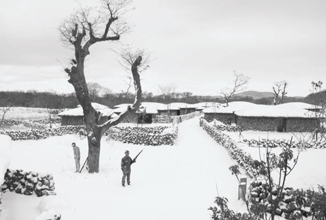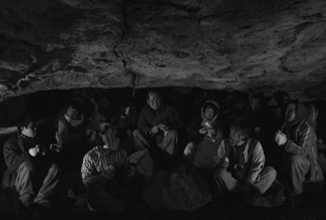"Can you kill people? If you stay, you'll have to kill innocent people."
Background:
In November 1948, the US military in Korea issued an order stating that all those living five kilometres or more outside the peninsula were to be considered as communist rebels and shot on sight, with 'eviction' notices being posted throughout areas involved warning that unless those referred to in the order came forward and handed themselves in they would face being pursued and killed.
On learning of the situation and fearing for their very lives, many fled their homes to seek refuge in the countryside and mountains; including around 120 Jeju Island villagers who hid for an estimated 50-60 days in a mountain cave, braving freezing weather conditions and with less than a minimum of food supplies.
Jiseul is both the story of those 120 villagers and that of the South Korean soldiers sent to hunt them down...
Review:
The first couple of scenes in Jiseul - showing South Korean soldiers eating fruit inside a smoke-filled, abandoned village dwelling juxtaposed with island villagers gathering in a cramped hiding space trying to understand their situation and bickering to decide where they should go - largely set the course of proceedings for the first half or there abouts of the film's running time, with the ongoing day-to-day lives of the military in their makeshift camp gradually contrasted with villagers' efforts to find, and subsequently get used to, their temporary 'home' in the mountain cave. Not only is it blatantly apparent from the very earliest stages of proceedings that the villagers in question are nothing more than farmers and land workers, but their continued discussions, arguments and confusion - from worries about family members; to fears for the welfare of their animals still in the village; to why most of them didn't think to bring food with them - also underline the fact at every turn, setting them at polar opposites to the faceless 'commies' the soldiers have been told they are. Though this perfectly states the difference between the reality of the situation and perception/understanding of those on each side of the conflict, Jiseul's writer and director, O Meul, adds a vital extra layer by means of the higher ranking of the Southern soldiers repeatedly reiterating that they are simply performing their duty in removing a dangerous communist threat (and certainly in the case of Sergeant Kim, enjoying it) while the younger members of the military are referenced as being far less comfortable with accepting that assertion at face value - Private Park, for example, telling new recruit Dong-su that if he chooses to stay he will be forced to kill innocent people - thereby perfectly setting the scene for a massively pivotal moment (also featuring Private Park) occurring at almost the halfway mark of proceedings (more on this later).
However, the above doesn't even scratch the surface of O Meul's multi-faceted narrative, with numerous specific (and initially seemingly inconsequential) villagers' fears voiced just seconds before soldiers are shown resolutely realising them: A villager (named only as Won-sik's uncle) first worrying about not being able to feed his pig suffixed by a scene in which soldiers heave a dead pig into a huge boiling pot to cook; the same villager later trying to leave the temporary safety of the cave to check on his animal and being told in no uncertain terms that doing so is almost certain death, immediately followed by soldiers killing another pig after having tortured some village dwellers; villagers worrying about missing schoolgirl Soon-duk followed by a scene showing her standing frozen in terror, staring down the barrel of Private Park's rifle; etc etc etc.
Not only do these story 'links' provide narrative context relating to both the villagers and soldiers (prior to their first confrontation) but as we have lived, if you will, with the villagers' every fevered, desperate discussion, they also serve to increase viewer empathy for these people's plight as well as increasingly accenting the inevitability that everything they are, and what little they have, will be torn asunder sooner rather than later, in the process.
The decision to group each of the main story segments is under sub-titles written in Chinese, relating to spirituality and traditional Confucian ancestral rites - "To Fetch the Spiritual"; "Where the Spirit Stays"; "To Share the Food of the Spirit"; and "To Offer Desire to the Spirit" - to my mind, speaks of an overarching commonality separated by external worldly influences and though it could be said that the (deliberate) mundanity inherent to the depictions of the ongoing fears of the villagers and the associated day-to-day actions of the soldiers does slow the early stages of the story somewhat, I honestly feel this is not only justified by points I've already mentioned but, in fact, necessary to underpin the idea of worldly needs, desires and fears sitting at odds with spirituality.
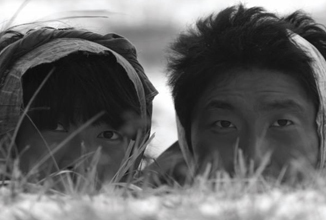 |
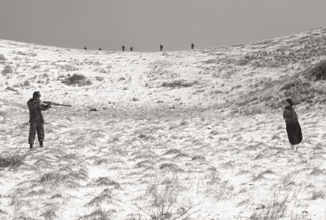 |
I've mentioned the pivotal scene featuring the characters of Private Park and schoolgirl Soon-duk already in this review but there is yet more to be said about its sheer importance to the film overall:
Coming at almost exactly the halfway point in the running time, it not only grips all the more like a vice as a result of coming in the wake of the aforementioned mundanity of the less vicious first hour of Jiseul, but also resolutely catapults the narrative into its second half; allowing Soon-duk's individual character arc to both detail atrocities carried out in the name of military orders and to foreshadow the brutality with which her friends and family will be dealt. Even more than that, the situation Private Park is placed in forces him to make an all-or-nothing decision that affects the ultimate outcome for him; Soon-duk; those closest to Private Park in the military; others' future actions relating to the eventual carrying out of the 'eviction' order; and, in turn, allows the depiction of one of the most prevalent and important themes found in any number of South Korean films detailing war and/or military confrontations. That is, dissection of humanity and commonality across military divides - the idea that beneath any militaristic doctrine or banner are human beings with more in common than should be set aside as a result of simply being on one side of a conflict or another. At a number of points throughout Jiseul, specific characters on both sides come to that very realisation - for example, the aforementioned decision made by Private Park in his standoff with Soon-duk; his "If you stay, you'll have to kill innocent people" statement; the villagers arguing over whether to kill a South Korean soldier who has been injured while helping them; and soldier Jung-gil's "No more killing" insistence and associated actions; etc - adding greatly to the poignancy of the narrative's brutal culmination, at the same time as deftly reiterating what I feel is one of the film's ultimate themes.
The one area of Jiseul that would have benefitted from more depth is the explanation of story background at the start of the film: We are presented with text on screen detailing the 'eviction' order prior to the first scene but there is no mention of the fact that it came as a result of the Jeju Uprising in April 1948, which was in response to police firing on a demonstration commemorating the Korean struggle against Japanese rule and quickly turned into a armed backlash against the US-backed military government in South Korea. While the succinct nature of the text exposition provided is understandable (and it should be noted that any discussion whatsoever of the massacre was a criminal offence in Korea until close to the end of the 1990s), I feel that, certainly for those viewers outside Korea coming to Jiseul with perhaps no knowledge of the background leading to the depicted situation, some further background information would have allowed greater historical context to be added to proceedings; especially considering the likelihood of a film such as this being screened at film festivals around the world.
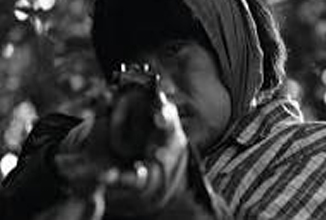 |
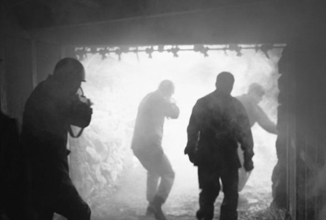 |
Black and white throughout, Jiseul is striking cinematically with director O Meul using the bleakness of monochrome imagery to add gravitas to proceedings at the same time as visually contrasting the overt whiteness of the snow-covered countryside with the almost total darkness of both the interior of the villagers' cave and indeed of their terrible situation. Repeatedly, we are shown visuals of smaller areas of outside brightness streaming into the blackness of their temporary abode and though it could be said that these bring a momentary reference to 'light at the end of the tunnel', if you will, O Meul increasingly suffixes it with elements (soldiers at the bright cave entrance etc) to underline the fact that for the villagers there is nowhere they can hide, no place to bring them hope nor even temporary safety; no matter how bright the distance may at times appear.
As is the case in numerous war films, O Meul also makes use of music accompanied slow-motion montages, of a sort, in the brutal 'massacre' segments, and though their appearance will likely come as little surprise considering the storyline they work incredibly well, nonetheless.
Credit should also be given to O Meul for largely choosing to have the brutality itself within scenes take place off screen with the camera focused on the reactions of other characters (such as in the case of Soon-duk's torture and rape); thereby allowing greater empathy to be created by forcing viewers to go through exactly what outside characters do and see their inability to stop transpiring atrocities almost first hand.
As far as the cast of Jiseul is concerned, O Meul had non-professional Jeju Island natives play the parts of the villagers, speaking in authentic Jeju dialect (in the version of the film used for this review their dialogue comes with both English and Korean subtitles) and while there are a couple of instances where their lack of acting experience is apparent in the performance of their dialogue, the realism their inclusion gives to the film and individual character arcs more than makes up for it.
Summary:
Based on the true-life US military-ordered 'eviction' of communists from Jeju Island in 1948, 'Jiseul' is as bleak as it is striking, as intricate as it is poignant; a deft cinematic piece truly worthy of the accolades it has received throughout the world.
Cast: Lee Kyong-jun, Hong Sang-pyo, Mun Seok-bum, Sung Min-chul
Directed by: O Meul
|


